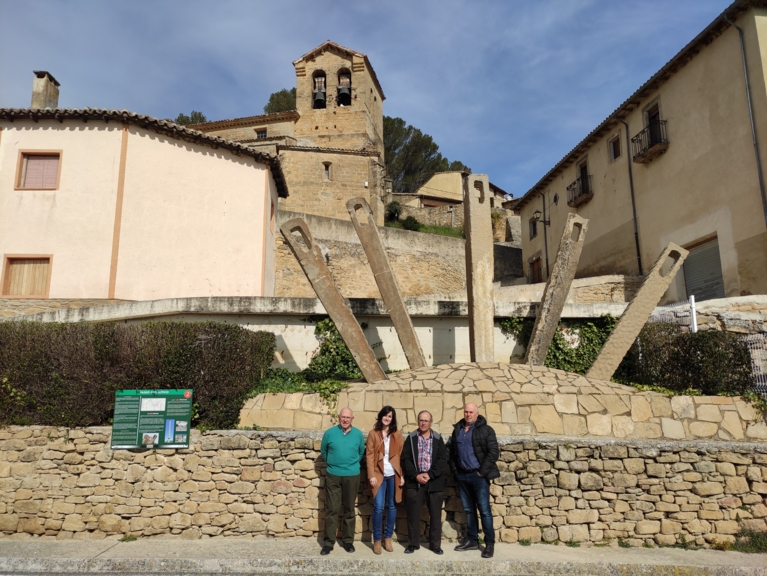Capital Energy and Eslava sign the enterprise’s first agreement in Navarra pursuant to its Territories Project

From left to right: The Mayor of Eslava, Ignacio Barber; and the head of Promotion in Navarra of Capital Energy, Beatriz Talaverano; together with the councillors José Javier Bariáin and Jesús Ángel Guillén.
- This initiative combines Capital Energy’s contribution to the decarbonisation of the economy and the transformation of the energy model with its desire to help foster the development of Spain’s regions, harnessing local talent and nurturing their social, industrial and business fabric
- Joluga will have an installed capacity of 20 MW, will generate enough clean electricity to cover the consumption of almost 25,000 households in Navarra each year, avoiding the emission of more than 24,000 tonnes of CO2, and will have an annual economic impact on local coffers of around 100,000 euros
Eslava (Navarra), 23 March 2022.- Capital Energy, the Spanish energy enterprise founded two decades ago aiming to become the first vertically-integrated, 100%-renewable energy operator in the Iberian Peninsula, takes a step forward in its commitment to the socio-economic development of Navarra, an important region in its clean energy project.
The enterprise and the municipal government of Eslava have signed the first collaboration agreement pursuant to its Territories Project in the region, and the eighth in Spain. The project combines Capital Energy’s contribution to the decarbonisation of the economy and the transformation of the energy model with its desire to help foster the development of Spain’s regions, harnessing local talent and nurturing each area’s social, industrial and business fabric.
Through this latest agreement, Capital Energy undertakes to foster various actions during the construction of the Joluga wind farm, agreed between the two parties and tailored to the municipality’s needs. These interventions will be implemented within the framework of specific action lines, including the improvement of infrastructure and services, connectivity and digitalisation, protection of artistic and cultural heritage, education, health and socio-occupational integration of disadvantaged groups.
Indeed, some initiatives to benefit residents of Eslava are already in the pipeline, such as the protection of the archaeological site of Santa Criz, recognised as a site of cultural interest by the Government of Navarra; job creation among young people and vulnerable groups; the implementation of energy efficiency and self-sufficiency projects in municipal facilities or the improvement of water consumption management in the locality.
Likewise, the collaboration between the local government and the renewable energy group will persist in the operating and maintenance phase of the renewable asset, as they will continue to carry out initiatives that fulfil the aforementioned requirements. These agreements underscore the commitment of both the municipal government and the enterprise to contribute to the sustainable development of the municipality through actions that effectively improve the quality of life of the residents and the surrounding community.
Joluga will be located in the municipalities of Eslava and Ezprogui, and its power evacuation line in the towns of Ezprogui, Sada, Leache, Aibar and Lumbier, to which Capital Energy is offering similar agreements to the one signed with the municipal government of Eslava. This wind farm will have an installed capacity of 20 megawatts (MW), distributed across five wind turbines, each with a capacity of 4 MW. It will produce around 60,000 megawatt hours (MWh) of clean energy each year, equivalent to the consumption of almost 25,000 households in Navarra, and will avoid more than 24,000 tonnes of CO2 emissions annually.
The construction of this wind farm will entail an investment of more than 20 million euros, as well as the creation of approximately 78 jobs at the peak of the construction period. During the operating and maintenance phase, it is expected to provide permanent employment to 3 professionals from the area and it will also generate approximately 2 indirect jobs.
Moreover, Joluga will add around 100,000 euros to the local coffers every year throughout its useful life—through the payment of taxes and land leases—and will contribute more than 480,000 euros to GDP. In addition to this recurring sum is the one-off payment of local building tax (ICIO), which will exceed 500,000 euros.